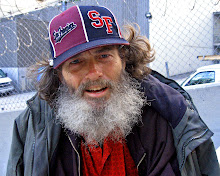 How accurate is the separation of people into the “clean” and the “unclean” categories? (See Tuesday, October 9, 2007) Sr. Helen Prejean, author of Dead Man Walking once said, "The government would like you to believe that the unclean are the gays, welfare recipients, immigrants and prisoners." But are these individuals the only ones who are "unclean?" Could there be others?
How accurate is the separation of people into the “clean” and the “unclean” categories? (See Tuesday, October 9, 2007) Sr. Helen Prejean, author of Dead Man Walking once said, "The government would like you to believe that the unclean are the gays, welfare recipients, immigrants and prisoners." But are these individuals the only ones who are "unclean?" Could there be others?When one really thinks about it, each and every one of us is "unclean." Each of us in our own special way is broken and damaged. We know this to be so when we call to mind our excesses, addictions, anxieties, compulsions, failures and broken relationships. And so this unfortunate reality poses many questions for those of us who knowingly or unknowingly hold to a "clean" and "unclean" mentality. How long will it be before we stop running from ourselves and befriend God’s mercy for our own “uncleanliness?” How long will it be before we befriend the “loser” inside of us? How long will it be before we befriend those parts of our lives that we are most ashamed?
When we finally slow down enough inside and allow the personal embrace of brokenness to happen, then we are ready both to receive and to give the mercy of God. Now we are ready to shed false images of ourselves; the ones where we see ourselves as smart and rad or powerful, rich and having it all together. Let us exchange the false notions of ourselves for the authenticity of accepting personal brokenness. In this reality we are ready to discover a Savior who provides all the grace we need to become “clean.” We are now empowered to believe and to know that others can become "clean" too as we see our own busted lives transformed.
Ultimately we pass from the judges of others to their mediators when we embrace the personal reality of the “poverty” within each of us. We wholeheartedly accept that we too are “unclean” and in need of a Savior. It is in embracing this reality and knowledge about ourselves that we are propelled to become servants and mediators of mercy to the poor, homeless, prisoner and all others who are broken and discarded.
Please scroll down and vote in the HIA Polls. Your opinion counts!


























6 comments:
Wow - reality checks are crucial to life. Thanks for sharing. C
Every society has its cultural norms for ritual purity, i.e., explicit or implicit rules governing what is acceptable and unacceptable. Such cultural norms were quite elaborate and rigid in 1st Century Judea and Palestine: Certain foods, Non-Jews, lepers, menstruating women, tax collectors, prostitutes, were all ritually impure, and no pillar of the community would partake of or associate with them. The most ritually impure object for that society was an impaled corpse; it was to be taken down before sunset or avoided at all costs.
In his crucifixion, Jesus the Christ became the most ritually impure object that his society could imagine. But, God's justice and sanctifying power were greater than the worst ritual impurity - God's righteousness and holiness would not allow God's most faithful servant to see corruption.
The Supreme Being, the fountain of all holiness, resurrected Jesus from a most ignominious death as a sign of God's own life-giving and sanctifying power in the world, as
well as a final seal of approval on all of Jesus' words and deeds.
Now, that same sanctifying power that proceeds from the throne of God is offered to all of mankind through his anointed one, his Christ. So, now, we too can realize, as Peter later did, that is not for us to call unclean, what God has declared clean. M.A.
M.A.,
Good perspective from history. I'd like to add that by letting himself be impaled, God not only "killed" the notion of what is ritually impure in Christ, he also paved the way for the rest of us in "clean" society to help all those who are sick, weak or downtrodden.
JF
I really love what you’re doing with the website, a great forum for homeless to feel connected. Ultimately (hopefully?) the connection will bridge the gaps between them and [non homeless] bringing more people to help in the streets.
The older I get the more I realize the "poverty" within me. I don't fake how fine I feel or am--I'm more realistic. As I contemplate that God accepts the good, the bad and the ugly in me--accepts me just as I am, it's actually a relief. In other words, when I give myself a break from condemnation it's easier for me to be compassionate toward other people.
Raby Savage,
I totally get what you mean and it is something that I am just beginning to discover in myself. Rather than focus on the "why's" about myself and others, I just accept the graces of the holy spirit. I am much less distracted.
Post a Comment